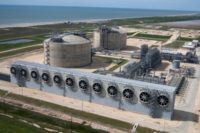Gas supplies to Israel are set to resume this month from a field in Egypt’s northern Sinai desert after a Feb. 5 pipeline explosion that was believed to be terrorist-generated. But Israel’s national infrastructure ministry has decided to fast-track a proposed $300-million liquified-natural-gas project off the country’s central Mediterranean coast as part of an effort to diversify its sources of supply.

Israel Natural Gas Lines, a state-owned utility, has issued a request for information for the project’s infrastructure. Egypt supplies 40% of Israel’s gas supply, which is used mostly for power production, with the rest coming from a gas field off Israel’s southern Mediterranean coast. The pipeline also provides supplies to Jordan, Syria and Lebanon, according to published reports.
“Our aim is to get the project up and running by the end of 2012,” says Infrastructure Minister Uzi Landau. The government had approved a permanent offshore LNG facility, which was set to come on line in 2015. “We’re now looking at a floating terminal that can be built and operated by early 2013 at the latest,” says Shaul Zemah, the ministry’s director general.
The facility will be located 4.5 kilometers offshore from Hadera, which is 45 km north of metropolitan Tel Aviv. Plans call for a 45-meter-deep pipeline running from the floating platform to the coast, where it will link up with Israel Natural Gas Lines’ national gas transmission network.
Israel Electric Corp. has issued its own RFI for LNG tankers with their own onboard regasification capability. Israeli and foreign exploration companies discovered huge quantities of gas in the past two years off of Israel’s northern Mediterranean coast, but those supplies are not likely to reach the local market before 2013, at the earliest. In addition, the government has decided to diversify its sources of supply.
Until the Egyptian gas supply resumes, the Israeli Ministry of Environment said it would permit use of fuel oil to run powerplants to avoid a drop in electricity production.




